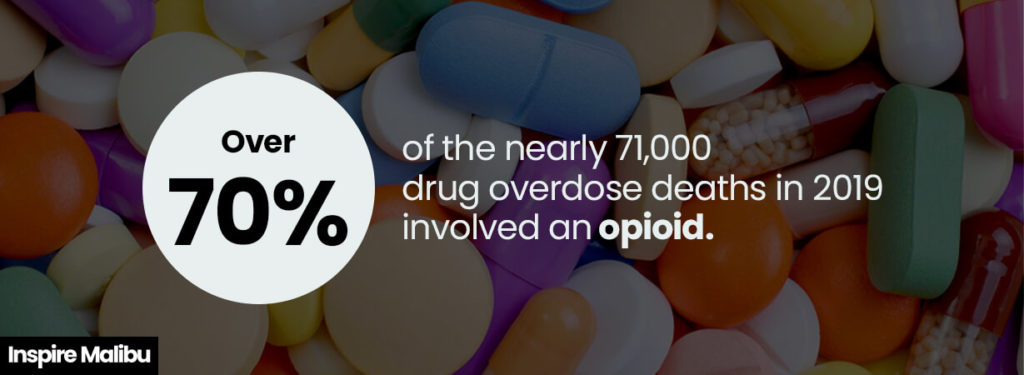Opiate Addiction
Inspire Malibu Opiate Addiction Treatment Center
Opioid addiction has become an epidemic in the United States.
We provide opioid and opiate addiction treatment at our facilities in Agoura Hills and Malibu, California and serve the surrounding areas, including Woodland Hills, Calabasas, Westlake Village, Thousand Oaks, Sherman Oaks, Studio City, Tarzana, Oxnard, Encino, Ventura, and Santa Barbara.
Nearly 841,000 people have died since 1999 from a drug overdose.1 In 2019, 70,630 drug overdose deaths occurred in the United States. The age-adjusted rate of overdose deaths increased by over 4% from 2018 (20.7 per 100,000) to 2019 (21.6 per 100,000).
- Opioids—mainly synthetic opioids (other than methadone)—are currently the main driver of drug overdose deaths. 72.9% of opioid-involved overdose deaths involve synthetic opioids.
- Opioids were involved in 49,860 overdose deaths in 2019 (70.6% of all drug overdose deaths).
- Drug overdose deaths involving psychostimulants such as methamphetamine are increasing with and without synthetic opioid involvement.
Drug overdose deaths involving synthetic opioids and methamphetamine have shifted geographically.
- From 2018 to 2019, the largest increase in death rates involving synthetic opioids occurred in the West (67.9%).
- The largest increase in death rates involving psychostimulants occurred in the Northeast (43.8%).
- Previously, the East had the highest increases in deaths involving synthetic opioids, and the Midwest had the highest increases in deaths involving psychostimulants.
- No state experienced a significant decrease from 2018-2019.
Those are just numbers, though. When you think about how your mother, your brother, your best friend, or someone else you know could be one of those 70,630 Americans that were killed by opiates, that’s when you get a grasp of how serious opiate addiction really is.
For most opiate addicts, it starts innocently enough – they’re prescribed Vicodin (hydrocodone), Oxycontin (oxycodone), or a similar drug for a legitimate medical reason, as opiate-based medications are extremely effective in the treatment of chronic pain (physical injury, recovering from surgery, etc.).
But those pills are highly habit-forming, especially if the patient is already dealing with depression, past trauma, or some other issue. At Inspire Malibu’s Opiate Addiction Treatment Center, we understand that for some people, an unintended consequence of taking these drugs is full-blown opiate addiction.
Don’t let opiate addiction control you or your loved one’s life. Our opiate rehab treatment program helps patients free themselves from their addiction and successfully get their lives back.

What are Opiates?
Opiates are medications with intense euphoric and pain-relieving effects. They’re based on compounds found naturally in the opium poppy plant, papaver somniferum (in modern day medicine, the majority of opiates are produced artificially rather than directly from poppies). Humans have been using opiates both for pain relief and recreationally for thousands of years, with the first recorded use dating as far back as 4,000 B.C in the ancient civilization of Sumer.
What Does Opiate Addiction Entail?
While opiates are excellent for dealing with acute pain, they’re dangerously habit forming for the same reason. Opioids bind to receptors in the brain that control pain and reward, giving users the feeling of comfort and euphoria.
Misuse, such as taking more than prescribed, or continuously self-medicating with prescription painkillers, creates a tolerance. Those who develop a tolerance must take more and more to achieve the same effect. This is not only dangerous, but it can lead to long-term dependence and sometimes-fatal overdoses.
Without access to the drug, users who aren’t in rehab for opiate addiction can experience painful withdrawal symptoms such as:
Dependence to opiate painkillers can occur for many reasons. Those at high risk for opiate addiction and in need of opiate treatment might fall into the following groups:
Whatever the case might be, our opiate treatment center allows patients to recover safely and comfortably. Our treatment specialists monitor each patient during every phase of their rehab.
Managed Maintenance has proven highly successful for opiate treatment. This allows clients to complete detox in a safe and comfortable manner without suffering from the debilitating symptoms of withdrawal usually associated with conventional detox programs.
It’s estimated that 80% of people suffering from opiate addiction will relapse without Managed Maintenance in their opiate treatment program.
Inspire Malibu is State Licensed by the Department of Health Care Services
- • Board-certified in Addiction Medicine by the American Board of Addiction Medicine
- • Board-certified in Psychiatry by the American Board of Psychiatry and Neurology
- • Named the Top Addiction Professional of the Year 2011 by Who’s Who in America
- • Patients Choice Physician Award Recipient in 2011
- • First physician in California to be licensed to use Suboxone for addiction treatment.
